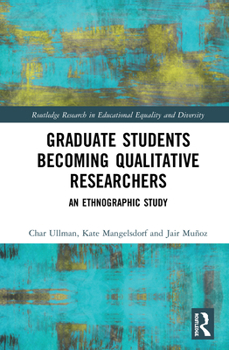Graduate Students Becoming Qualitative Researchers: An Ethnographic Study
Through conducting an ethnographic study about doctoral students from traditionally underrepresented groups who are learning to conduct ethnographic research, this volume offers unique insight into the challenges and experiences through which these students develop their skills and identities as qualitative researchers.
Foregrounding the stories and perspectives of students from minority backgrounds including Latinx, Black, differently abled, and queer students, Graduate Students Becoming Qualitative Researchers identifies how the process of learning to conduct ethnographic research underpins doctoral students' success, confidence, and persistence in the academy. Chapters follow students during a one-year ethnographic research course during which they learn about ethnography, and also conduct observations, write field notes, interview participants, and gather artifacts. Offering important pedagogical insights into how ethnography and academic writing are communicated, the text also tackles questions of access and diversity within scholarship and highlights barriers to first-generation and minoritized students' success, including impostor syndrome, stereotype vulnerability, and access to time, knowledge, and capital.
This volume will prove valuable to doctoral students, postgraduate researchers, scholars, and educators conducting qualitative research across the fields of education and rhetoric, as well as the humanities and social sciences. It will also appeal to those interested in multiculturalism and diversity within the education sector.





